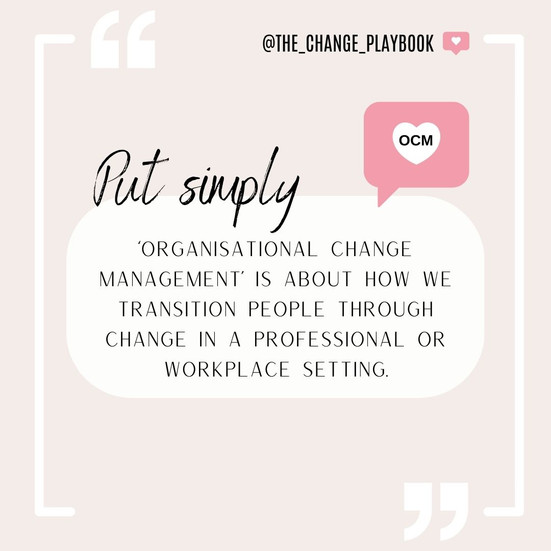Organisational Change Management (OCM) - ELI5* - What's The Deal?!
- Elizabeth Dunn
- Feb 27, 2024
- 6 min read
Updated: Mar 6, 2024
*explain it like I'm 5.
You might have heard people talk about Organisational Change Management – or ‘OCM’ as we sometimes call it for short – and thought ‘I would LOVE to know more about that, but it sounds so complicated, I wouldn’t even know where to start.’
That's okay, that's what we're here for.
Let’s start right at the beginning.
If you want to delve into the detail of the textbook processes, user manuals and industry standard frameworks surrounding OCM (of which there are a lot!) then absolutely, it can be a lengthy topic to grasp and absorb.
But if we lift it up a level and look at it through a simple lens, the concept itself is relatively straightforward, and can apply to many facets of life, both professional and personal.
So, let’s break it down in to simple steps and walk through it together.
Let's start with 'Change Management'.
Well believe it or not, it’s not a trick question; Change Management (or 'CM') does what it says on the tin – to put it very simply, it’s the process that we use to manage change.
Here’s an official definition:
'Change Management (CM) is the systematic approach and application of processes, tools, and techniques to manage the people side of change, effectively transitioning people from a current state to a desired future state.’
So, think of it this way:
If we want to make any kind of change to something we are currently doing, ‘Change Management’ is the structured process we use to guide people through that transition, step by step.
But wait, why do we need to ‘manage’ change? That sounds like a lot of effort.
It’s a great question and a valid thing to challenge.
Imagine this - we’ve decided we need to change from one way of doing something to another. We know what we want people to do, and we don’t think it’s hard to do it the new way, from our perspective - it should be simple, right? Just tell everyone what you want them to do differently, and job done. So why would we need to put so much time and energy in to managing that change?
Well, change can be complex. Not always because the change itself is actually complicated, but because the way people react to change can be unpredictable. When people are involved in change, it can be much harder than we initially think to move from point A to point B.
You’ve probably heard this phrase thrown around ... ‘people don’t like change’.

And from an evolutionary point of view, that’s true. We’re programmed to be wary of change because anything that takes us out of our comfort zone and disrupts our routines breeds uncertainty. And uncertainty triggers fear. So, we are naturally predisposed to see change as a threat, which can lead to resistance, and sometimes an outright refusal to participate or play along.
Suddenly, something we thought would be an easy, straightforward change to make, becomes a really hard thing to action. People’s emotions and fears get entangled in the change, and we can’t find a way through to making it happen. Where does that lead is? Back to square one.
By having a proactive approach to how we manage change - step by step - we help guide people through the change process with us, and we address concerns and reduce resistance as we go, ultimately making the change journey much smoother and way more successful.
So what is ‘Organisational Change Management’?
Again, let’s keep it simple and build on what we have just learnt.
If Change Management is about the process we use to guide people through change, then ‘Organisational Change Management’ is simply about how we transition people through change in an organisational (or ‘work based’) setting.
And as our workplaces are changing at a faster rate than they ever have before, it’s becoming increasingly important for companies to lean into the need to have a structured approach to OCM ( or BCM - Business Change Management - as it is sometimes referred to interchangeably.)

The world around us is changing at such a fast pace, that in order to survive, businesses can no longer stand still and remain static in what they do and how they do it. They have to continually invest in changes to technology, people, processes and culture to stay on top.
Think of it this way; imagine you have worked in the same company for the last 10 years - the way that company operated when you joined on Day 1 will be radically different to the way it operates today. You’ll probably have seen changes to the business organisation structure, the roles and skillsets of the people, the technology it uses, the day-to-day processes - maybe even the products it sells or the customer base that buys them.
To stay relevant and profitable, organisations have to keep changing.
And the best way to make sure those changes are successful, is to manage change well internally.
How we guide people through change at work can make or break the success of the change itself, so using a pro-active, tried and tested approach is what’s going to make our changes happen.
Here’s an official definition:
'Organisational Change Management (OCM) is the structured approach and set of strategies employed to facilitate and support individuals, teams, and organizations through planned changes in a professional setting. It involves understanding the human side of change, managing resistance, and fostering adoption of new behaviours and processes to achieve desired business outcomes.'
Here is the key to that definition – great organisational change management helps us to ‘achieve desired business outcomes.’
Whenever we decide to make changes in the workplace, there’s usually going to be a business benefit associated with the change we’re making; it’s not often we’ll be switching things up for no reason. For example, by moving from ‘this’ to ‘that’ we’ll get ‘this benefit’ - it could be more sales & profit, reduced costs, better customer retention, better employee satisfaction, etc.
Planned change is (almost) always driven by a desired business outcome.
If we manage that change well and get everyone onboard and willing to make the change a success, we’re more likely to achieve that positive business outcome.
So ‘Organisational Change Management’ can often be the key enabler to keeping a business healthy and thriving.
Having a structured approach to OCM makes change in the workplace much smoother to execute. The more time and focus you put on OCM, the more 'change ready' your organisation will be, and the more 'change ready' you are, the quicker you'll be able to respond to changing market trends and opportunities.
I'm hooked! So how do I learn more about OCM?
There are plenty of extensive OCM frameworks out there that we can point you in the direction of, but a lot of people keep telling us that they just don’t have the time or energy to delve into the detail, and we totally get it.
Traditional best practice ‘Change Management’ methodology is great (and we'll talk more about some of the most popular frameworks in future blogs) but they can be extremely comprehensive and complex. A lot of our clients tell us that they want to learn more about leading change, but there’s just not enough time in the day to fit it in alongside their current day job and life commitments.
And even when they do find time to delve into the textbooks, it can be tricky to decipher how to apply the theories practically, or how to tailor them to your individual business or unique scenarios.
At @the_change_playbook we believe in making OCM simple.
We believe that the key in making more organisations ‘change ready’ is by educating as many people as possible in what OCM is and how to do it well.
So, we break the big topic of ‘change’ down in to simple, digestible chunks.
We believe that knowing how to navigate change is not just for the experts, the professionals and change management practitioners anymore. It’s for everyone.

We ditch the big bulky textbooks and the complex terminology, and we talk about change in a way that resonates with people.
We bring everyone on the OCM learning journey with us, one small subject at a time.
It’s change. Made simple.
Are you ready for your OCM Learning journey?
Join our community.

If bite sized learning sounds like your cup of tea, keep an eye on ‘The Change Playbook Blog’ where we’ll be delving in to a different OCM based topic each week.

And follow us on Instagram @the_change_playbook so you don’t miss a beat.

If you’ve got any OCM based questions or specific topics you’d like to see us break down on our blog, drop us a line at elizabeth.dunn@thechangeplaybook.co.uk.
Let’s learn how to lead change together.
One simple step at a time.





















Comments